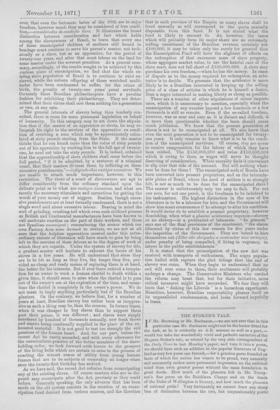THE BRAZILIAN SLAVE ACT.
rpm recent enactment of the Brazilian Government with
regard to the Slave population of the Empire has been described in some quarters as an act of emancipation, but if it is one, emancipation in Brazil must mean something not very like emancipation anywhere else. In the first place, it may be said to emancipate nobody. With the exception of a few hundreds of slaves who were so fortunate as to be State pro- perty, and whom the State freed forthwith—probably because they were only a few hundreds—the entire, enormous multitude of 1,500,000 or 2,000,000 slaves existing in Brazil are to continue to exist in Brazil. Slaveowners who may be desirous of emancipating their bondsmen are, indeed, generously permitted by the Act to carry out their intention. As, however, they had this liberty previous to the Act, any marked progress is not very visible. We must look to future generations before we can perceive the benefits, such as they are, of the new measure. By the first article of the law to which the Princess- Imperial Regent, in the name of his absent Majesty Pedro II., affixed the Royal signature on the 28th of September, it is enacted that all children born of slave women in the Empire since that date are to be considered of free condition. Here is the kernel of the whole measure. The child born after midnight of the 27th is a freeman. The child born before midnight is a chattel,—intractable infant, that did not regulate his appearance in this world according to the legisla- tive clock of Rio de Janeiro l It is not to be supposed, how-
ever, that even the fortunate babes of the 28th are to enjoy freedom, however much they may be considered of free condi- tion,—considerados de condicdo livre. It illustrates the broad distinction between consideration and fact which holds among the slaveowners of Brazil, to learn that every one of these emancipated children of mothers still bound in bondage must continue to serve his parent's master, not tech- nically as a slave, but as an apprentice, for the period of twenty-one years, and after that must labour on the land for some master under the severest penalties. As a general sum- mary, accordingly, of the results sought to be achieved by this curious piece of emancipation, we find that the whole ex- isting slave population of Brazil is to continue to exist en- slaved, while the unborn offspring of those wretched multi- tudes have been condemned to suffer, for the crime of birth, the penalty of twenty-one years' penal servitude. Certainly those Brazilian philanthropists have a peculiar fashion for exhibiting their philanthropy. They are deter- mined that their virtue shall cost them nothing for a generation or two, at any rate.
The general interests of slavery being thus tenderly con- sulted, there is room for some piecemeal legislation on behalf of humanity. To this category may be set down the stipula- tion that if the master of an apprentice so elects, he may re- linquish his right to the services of the apprentice on condi- tion of receiving a sum which may be approximately calcu- lated at sixty pounds sterling from the State. If the master thinks that he can knock more than the value of sixty pounds out of his apprentice by working him to the full age of twenty- one, he need not take the sixty pounds. It is, indeed, ordained that the apprenticeship of slave children shall cease before the full period, "if it be admitted, by a sentence of a criminal court, that their masters ill-treat them by inflicting on them excessive punishments,"—ilifligindo-Iltes castigos excessivos. We are unable to attach much importance, however, to this restriction. The views of a court of slaveowners are apt to differ considerably from the ordinary standard upon the delicate point as to what are castigos excessivos, and what are merely the necessary stimulants and correctives for getting the worth of your money out of niggers. Besides, though exces- sive punishments are at least formally condemned, there is not a single word said about excessive labour. Bearing in mind the sort of grinding, crushing toil which even such civilized persons as British and Continental manufacturers have been known to call moderate exertion on the part of their workers, and these not Brazilian einancipati ; remembering the scenes which our own factory Acts were devised to obviate, we are not at all sure that the helpless apprentices created under this extra- ordinary statute of liberation will have much to gain by being left to the mercies of their drivers as to the degree of work of which they are capable. Under the system of slavery for life, a prudent master will hesitate to exhaust the forces of his slaves in a few years. Ho will understand that since they are to be his as long as they live, the longer they live, pro- vided no cheap and ready means of replacing them is at hand, the better for his interests. But if over there existed a tempta- tion for an owner to work a human chattel to death within a given time, it should seem to arise when the chattel is to pass out of the owner's use at the expiration of the time, and mean- time the chattel is completely in the owner's power. We do not mean to imply anything particularly bad of the Brazilian planters. On the contrary, we believe that, for a number of years at least, Brazilian slavery has rather been as inoppres- sive as such a thing may be, than the reverse. In former times, when it was cheaper to buy slaves than to support them past their prime, it was different ; and slaves were simply murdered by hundred of thousands annually, new fresh thews and sinews being continually supplied in the place of the ex- hausted material. It is not good to test too strongly the evil passions of the human heart. And, for our part, unless the recent Act be vastly amended, and with every allowance for the conscientious practice of the better members of the slave- holding order, we look forward wtth horror to the prospect of the living hells which are certain to arise in the process of exacting the utmost ounce of utility from young human frames that are to be subjects of ownership no longer when once the twenty-first birthday has arrived.
As we have said, the recent Act refrains from emancipating any of the existing slaves. Of course masters who are so dis- posed may emancipate after the Act, precisely as they could before. Generally speaking, the only advance that has been made on the old system consists in the creation of an eman- cipation fund derived from various sources, and the direction
that in each province of the Empire as many slaves shall be freed annually as will correspond to the quota annually disposable from this fund. It is not stated what the fund is likely to amount to. As, however, the taxes which will probably form its major share are an extremely trifling constituent of the Brazilian revenue, certainly not £100,000, it may be taken only too surely for granted that the Emancipation Fund will have the slightest of effects on the redemption of that enormous mass of slave property, whose aggregate market value, to use the hateful cant of the, slave mart, does not fall short of £150,000,000. A slave may purchase his own freedom,—when he has the money. In cases of dispute as to the money required for redemption, an arbi- trator is to decide. We presume that the arbitrator is more likely to be a Brazilian interested in keeping up the selling price of a class of articles in which be is himself a dealer,, than a negro interested in making liberty as cheap as possible..
There are a number of other stipulations of minor import- ance, which it is unnecessary to mention, especially when the emancipation of any number beyond a few hundreds or a few thousands is still so remote. Even if the so-called freedom, however, was as near and easy as it is distant and difficult, it is more than questionable whether the boon should cause much jubilation. We know that the present generation of slaves is not to be emancipated at all. We also know that even the next generation is not to bo emancipated for twenty- one years. It only remains to know what is to be the condi- tion of the emancipated survivors. Of course, they are never to receive compensation for the labour of which they have been robbed. The £150,000,000 and twice £150,000,000 which is owing to them as wages will never be thought deserving of consideration. White morality finds it convenient to slip over that side of the account. But will nothing what- ever be done for them ? The emancipated serfs of Russia have been converted into peasant proprietors, and on the intermin- able plains of Brazil, where the need of settlers is so strongly felt, is not as much to be done for the emancipated slave ? The answer is unfortunately only too easy to find. For not one acre, for not one perch, is the freedman to be indebted to his taskmasters. His highest distinction in the eyes of his liberators is to be a labourer for hire, and the Government will show him scant countenance if ho attempt to alter his condition. It would never do to establish a peasant proprietary, however flourishing, when what a planter aristocracy requires—slavery or no slavery—is a proletariat of labourers. "In general,' says one of the final provisions of the enactment, " the slaves liberated by virtue of this law remain for five years under the inspection of the Government. They are bound to hire• themselves out (Elles sew obrigados a contractar sous services); under penalty of being compelled, if living in vagrancy, to labour in the public establishments."
It is stated that the promulgation of the new Act was received with transports of enthusiasm. The negro popula- tion hailed with rapture the glad tidings that the end of slavery was come. When they begin to understand that no end will ever come to them; their sentiments will probably undergo a change. The Conservative Ministers who carried the reform may boast that, but for their initiative, more radical measures might have succeeded. We fear they will learn that " dishing the Liberals " is a hazardous experiment. Meantime, however, Brazilian respectability plumes itself on its unparalleled condescension, and looks forward hopefully to loans.



































 Previous page
Previous page